Posted: May 6, 2014
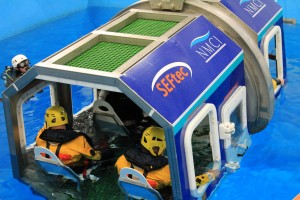 The NMCI featured in episode two of ‘Cork Mega Port’ on Monday May 5th. The episode showed the SEFtec NMCI Offshore (SNO) team delivering a BOSIET course for delegates preparing to work offshore. Underwater cameras were used to give an exciting insight of the helicopter safety and escape training in action in the sea survival pool. Four hour-long episodes have been produced by Goldhawk Media who spent over four months filming at the Port of Cork.
The NMCI featured in episode two of ‘Cork Mega Port’ on Monday May 5th. The episode showed the SEFtec NMCI Offshore (SNO) team delivering a BOSIET course for delegates preparing to work offshore. Underwater cameras were used to give an exciting insight of the helicopter safety and escape training in action in the sea survival pool. Four hour-long episodes have been produced by Goldhawk Media who spent over four months filming at the Port of Cork.
The crew behind the documentary followed all port employees including management, crane drivers, tug operators, pilots, launch crew and maintenance and engineering staff. Informative, engaging and often humorous this documentary focuses not just on the port’s operations but also on the people who make it all possible. Monday’s episode can been seen on TV3 player at http://www.tv3.ie/3player/show/608/0/0/Cork-Mega-Port
‘Cork Mega Port’ airs on TV3, Monday’s at 9pm.
Sign Up to our Newsletter
Click Here
Posted: December 17, 2013
From the Irish Examiner
Thursday, December 12, 2013
The founder and chief executive of Providence Resources, Tony O’Reilly, believes Cork could rival Aberdeen as a European hub for oil and gas exploration — if the county embraces the industry.
Providence’s Barryroe oil field could be pumping oil as early as 2018 and Cork will be on track to become an oil and gas hub, if people in the services industry make the investment of time and effort to install the full suite of service industries, he said.
Mr O’Reilly said people in the oil industry in Aberdeen are “very aware that Ireland is taking off and that Cork is going to be the place”.
He called for information sharing with the Scottish city. “I don’t know if you have ever been to Aberdeen, but Cork is a lot nicer and you have the tax rate here.”
Despite praising Ireland’s corporate tax rate, he took issue with a portrayal that Ireland’s oil and gas resources have been given away.
He argued that while the tax on extractive industries in Ireland was lower than in Norway and the UK, that is because they have proven industries in place.
Mr O’Reilly said that “Norway produces 2m barrels of oil every day hence they have a 78% tax rate; the UK a million-plus barrels a day; Ireland zero. Now hopefully we are going to change that, but you have to see it in that context.”
Referring to a report commissioned by Providence, Mr O’Reilly said: “The tax take from a field the size of Barryroe at the 40% tax that some people think is a giveaway, €4.5bn over its lifetime. That is just the corporation tax revenue. There is also the employment and all the associated benefits. That is equivalent to the whole corporate tax take in Ireland in 2011; that is just from one field.”
Mr O’Reilly said he is “evangelical” about promoting Ireland as the next frontier of oil and gas. He believes the stable political climate and government attitude will allow Ireland to emerge from the shadow of the North Sea.
“The activity like we are leading with Providence coupled with the proactive stance of the Government… coupled with the geopolitical climate in Ireland; you have got to understand that the majority of the oil in the world is in not nice places.
“This is a lovely place, I mean, we had guys working on the rig in Barryroe who could fly back into Cork and go play some golf at the Old Head. You can’t do that in Kurdistan”.
© Irish Examiner Ltd. All rights reserved
By Vincent Ryan
Business Reporter
http://www.irishexaminer.com/business/cork-could-be-europe-hub-for-oil-and-gas-252399.html

Sign Up to our Newsletter
Click Here
Posted: July 29, 2013
Monday, July 29, 2013 by Geoff Percival- Irish Examiner
“The main representative body for Ireland’s exploration industry has called for the Government to hold back on plans to increase the potential tax take from companies drilling for oil and gas in Irish waters.
As it currently stands, the Government stands to receive between 25% and 40% of profits from any commercial field in Irish waters — of which there are currently none (although Barryroe, in the Celtic Sea, is on course to be the first).
However, Natural Resources Minister Pat Rabbitte recently said that he intends to seek independent expert advice, by the end of this year, on what level of fiscal gain should be achieved by Ireland and how the State should go about achieving it.
A recent Joint Oireachtas Committee called for the profit take to be as high as 80%, which would mirror the Norwegian model.
However, while it takes 78% of the profit from any commercial field in its waters, Norway — as well as having a more mature and developed offshore exploration industry than Ireland — also repays the same percentage of drilling costs to companies if said field is found to be dry; something Ireland — in current economic times — could not do.
At the end of a week that has seen international oil giant ExxonMobil put an indefinite pause on its interest in Ireland by finding no sign of any commercial hydrocarbons at initial drill at the highly-anticipated Dunquin field off the south-west coast of the country, the Irish Offshore Operators’ Association has called for a rethink by Government.
“We think the Government should be cautious in its approach,” said Fergus Cahill, chairman of the Irish Offshore Operators’ Association.
“It would be a great mistake to change the fiscal terms at this stage, especially in light of Dunquin, and at a time when we are just beginning to see more activity in Irish waters and more companies come in,” he added.”
http://www.irishexaminer.com/business/call-not-to-raise-oilgas-tax-take-238196.html
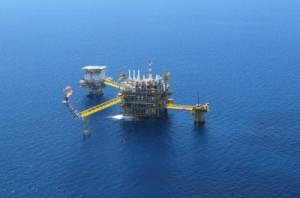
Sign Up to our Newsletter
Click Here
Posted: May 22, 2013
Fastnet Oil says independent assessment established presence of significant potential.
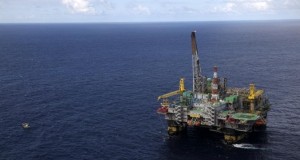
An independent assessment of explorer Fastnet Oil and Gas’s Deep Kinsale target off the south coast indicates that it could contain 2.3 billion barrels of oil.
Fastnet said today that an independent assessment of the licence area by SLR Consulting established the presence of a significant potential “unrisked” resource in place of over 2 billion barrels.
The group said that SLR carried out the assessment in accordance with generally accepted international procedures.
In February, Fastnet agreed a deal with Petronas subsidiary Kinsale Energy to farm into the so-called “deep Kinsale prospect”. It lies deep below the existing Kinsale gas field, which has by now given up all but 3 per cent of its reserves.
As part of its deal with Kinsale Energy, Fastnet carried out engineering and geological studies and a wide-ranging, three-dimensional seismic survey.
Fatnet said the independent assessment confirms that oil-bearing sands encountered in the Middle and Lower Wealden wells drilled by Marathon in the early 1970’s occur in the same geological structure that hosts the shallow producing gas sands in the Kinsale gas field.
The Deep Kinsale structure covers an area of up to 162 square km.
“Deep Kinsale is a large anticlinal structure, which has the potential to contain a significant oil accumulation directly beneath the producing Kinsale gas field and the two platforms, in the Celtic Sea,” Fastnet founder shareholder John Craven said.
Earlier this month, the oil and gas company, which is focused on near term exploration acreage in Africa and the Celtic Sea, was awarded a new licensing option in the North Celtic Sea. The option covers blocks in the Mizzen Basin, known as East Mizzen, and the western end of the North Celtic Sea Basin, offshore Ireland.
From The Irish Times-Pamela Newenham
http://www.irishtimes.com/business/sectors/energy-and-resources/deep-kinsale-could-contain-2-3bn-barrels-of-oil-1.1402539
Sign Up to our Newsletter
Click Here
Posted: May 13, 2013
From The Irish Examiner – By Geoff Percival
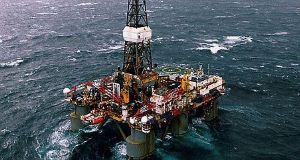
The Government is set to announce details of a major research contract to assess Ireland’s true oil and gas potential in the coming weeks, with industry rumours suggesting Italian giant Eni could be signed up as project partner.
The project will focus on a seismic survey off the west coast, to judge the oil and gas reserve potential of the under-explored Atlantic Margin area.
While the provision of “relevant depth of seismic data”, formed part of the recommendations from last week’s Providence Resources/PwC study into the potential of the Irish offshore sector, this seismic tender has been in the Government’s plans for nearly a year.
There has been speculation that Eni could be signing up to invest around €70m in carrying out the study, but the Department of Communications, Energy and Natural Resources has been tight- lipped over the details.
A department spokesperson said that the procurement process has concluded and project planning is at an “advanced stage”. “It is anticipated that an announcement will be made shortly,” they added.
Minister of State at the Department, Fergus O’Dowd, first announced the intention to tender for a seismic data specialist to undertake the detailed survey last year, when addressing the Atlantic Ireland Conference in Dublin.
Speaking then, he said that such a survey would be “a huge step forward” and would go a long way to revealing the true potential of Ireland’s frontier basins.
The real genesis of the programme was the Government’s 2011 Atlantic Margin Licensing Round, which attracted a positive response from industry but still resulted in large areas on offer receiving no applications, despite being located in basins containing proven petroleum systems.
A lack of available seismic data was viewed as a significant contributing factor that needed to be addressed, according to Government. The small number of exploration wells drilled in Irish waters, over the past decade, has been blamed on low levels of available intelligence, with poor seismic data coverage previously described by Government as “the biggest impediment to exploration”.
Last week’s PwC study into the potential of Ireland’s offshore exploration industry suggested that thousands of jobs could be created per year and the Exchequer could significantly increase its annual corporate tax take if certain existing barriers to entry, for overseas players, are removed.
“The oil and gas industry has the potential to transform local and national economies, but a critical mass of activity is needed before a substantial indigenous supply base can develop,” it said.
Extract From http://www.irishexaminer.com/business/contract-to-assess-oil-potential-231055.html
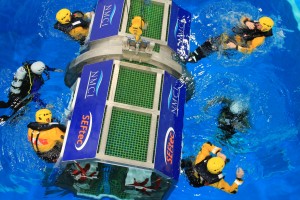
Sign Up to our Newsletter
Click Here
 The NMCI featured in episode two of ‘Cork Mega Port’ on Monday May 5th. The episode showed the SEFtec NMCI Offshore (SNO) team delivering a BOSIET course for delegates preparing to work offshore. Underwater cameras were used to give an exciting insight of the helicopter safety and escape training in action in the sea survival pool. Four hour-long episodes have been produced by Goldhawk Media who spent over four months filming at the Port of Cork.
The NMCI featured in episode two of ‘Cork Mega Port’ on Monday May 5th. The episode showed the SEFtec NMCI Offshore (SNO) team delivering a BOSIET course for delegates preparing to work offshore. Underwater cameras were used to give an exciting insight of the helicopter safety and escape training in action in the sea survival pool. Four hour-long episodes have been produced by Goldhawk Media who spent over four months filming at the Port of Cork.




Connect with NMCIS